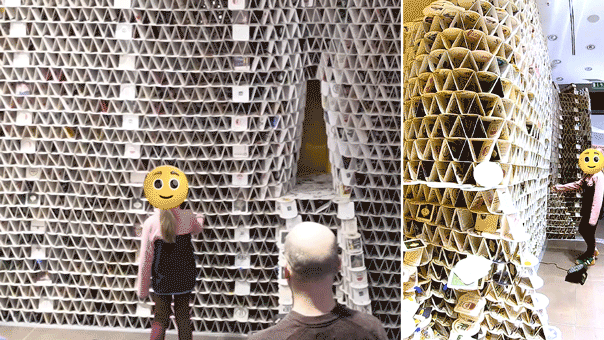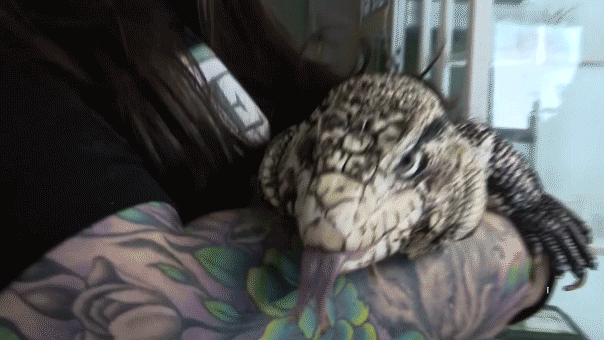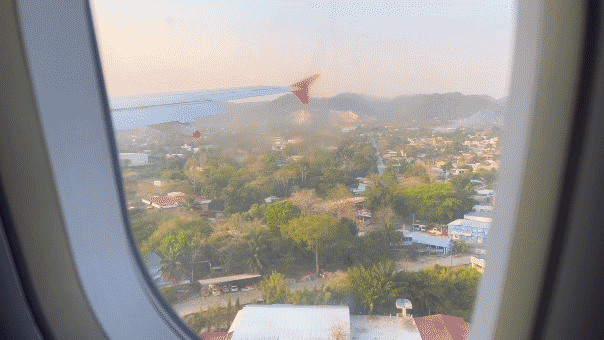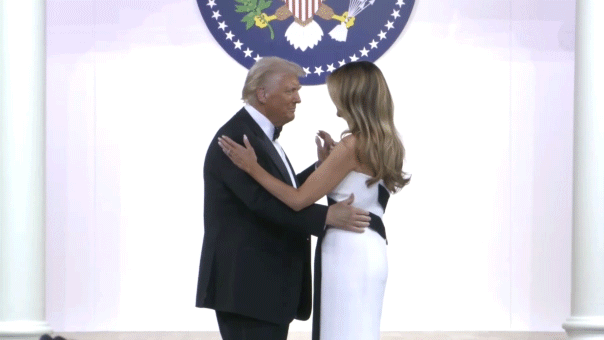Satin Dollz perform live in Times Square
The Satin Dollz, an international performance troupe that celebrates the sounds and styles of victorious World War II America, recently introduced its New York City chapter with a Fox News Digital-exclusive performance in Times Square.
New York City – The Great White Way is glowing again.
Broadway’s 41 theaters finally dropped mandatory mask mandates here in July, after they were among the very last holdouts in America of the controversial COVID restrictions that kept many tourists away from New York City.
The Big Apple suddenly feels "normal" again.
Broadway musicals grossed $30.1 million in sales last week, according to the Broadway League, nearly matching the same-week total of $30.6 million in pre-pandemic July 2019.
Crowds have storm backed to city streets, too, in near-record numbers.
Times Square, the heart of Broadway’s Theater District, welcomed an astounding average of 420,000 pedestrians Friday, Saturday and Sunday, the Times Square Alliance told Fox News Digital.
That's up 9.8% over the same weekend in pre-pandemic 2019, the organization said.
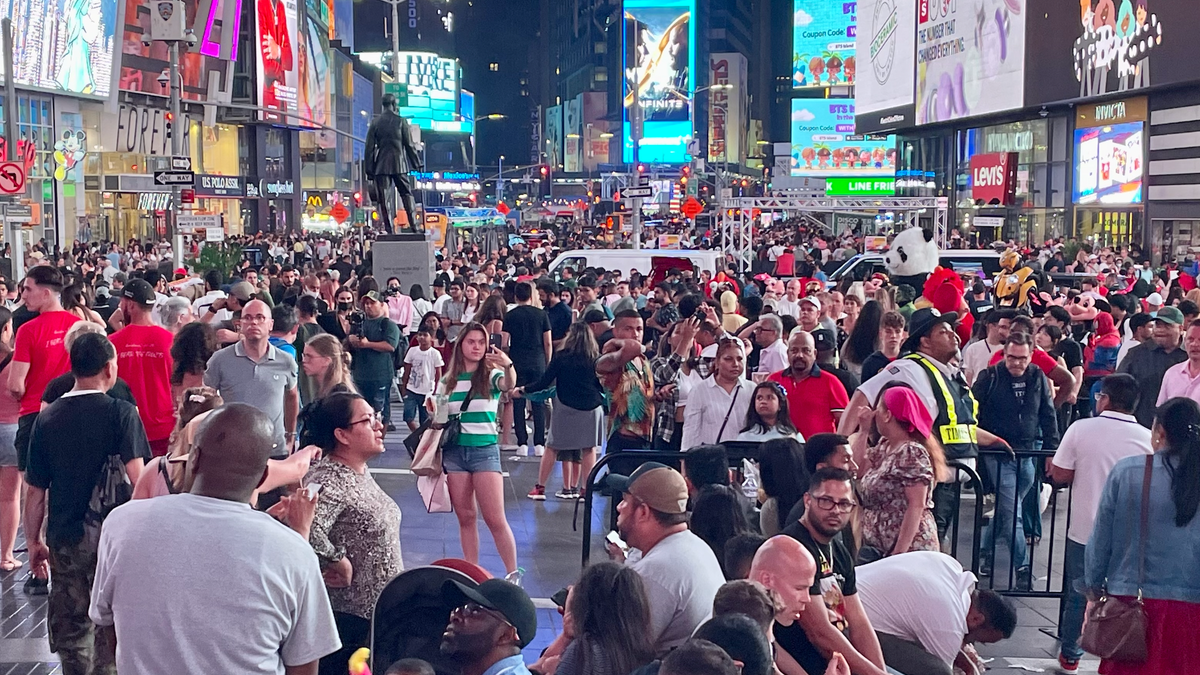
Tourists have flooded back into New York City in recent weeks, as this image captured on Saturday, July 16, shows. Times Square welcomed an average of 420,000 pedestrians per day the weekend of July 15-July 17, 2022 — up 9.8% over the same weekend in 2019, Times Square Alliance told Fox News Digital. (Kerry J. Byrne/Fox News Digital)
But there is actually much more to Broadway than just Times Square and its iconic theaters.
The world-famous thoroughfare, unbeknownst to most people, traverses the entire length of Manhattan — offering unique insights into America's biggest city far from the bright lights of Midtown marquees.
Here are 10 cool facts and sights along America's most famous road.
1. Broadway should be called Longway
Manhattan is 13.4 miles long and Broadway is the only road that spans the entire length of the crowded island — from the Harlem River just north of 220th Street to Battery Park and Staten Island Ferry on New York Harbor at the far southern tip.
Broadway is actually no broader than any of Manhattan's grand north-south avenues. If anything, the ancient path is more narrow. But it is easily the longest road in Manhattan, making it a perfect prism through which to experience all New York City has to offer.
Times Square averaged 420,000 pedestrians the weekend of July 15-17, 2022, up nearly 10% over the same weekend in 2019.
Walking all of Broadway in a single day has become a daring endeavor for both tourists and locals alike — something this reporter actually did recently.
2. Disobedient Broadway brazenly disrupts Manhattan’s disciplined street grid
Most of Manhattan follows an easy-to-follow grid pattern: low-numbered north-south avenues to the east and low-numbered east-west streets to the south.
Broadway doesn't care.
After cutting a generally straight north-south line from 220th Street to 60th Street, Broadway makes a sudden slash to the east at Columbus Circle, creating an obvious disruption to the busiest streets in America.
It also weaves a nest of crisscrossings containing many of New York City's most celebrated attractions.
3. New York City’s most famous squares on are Broadway
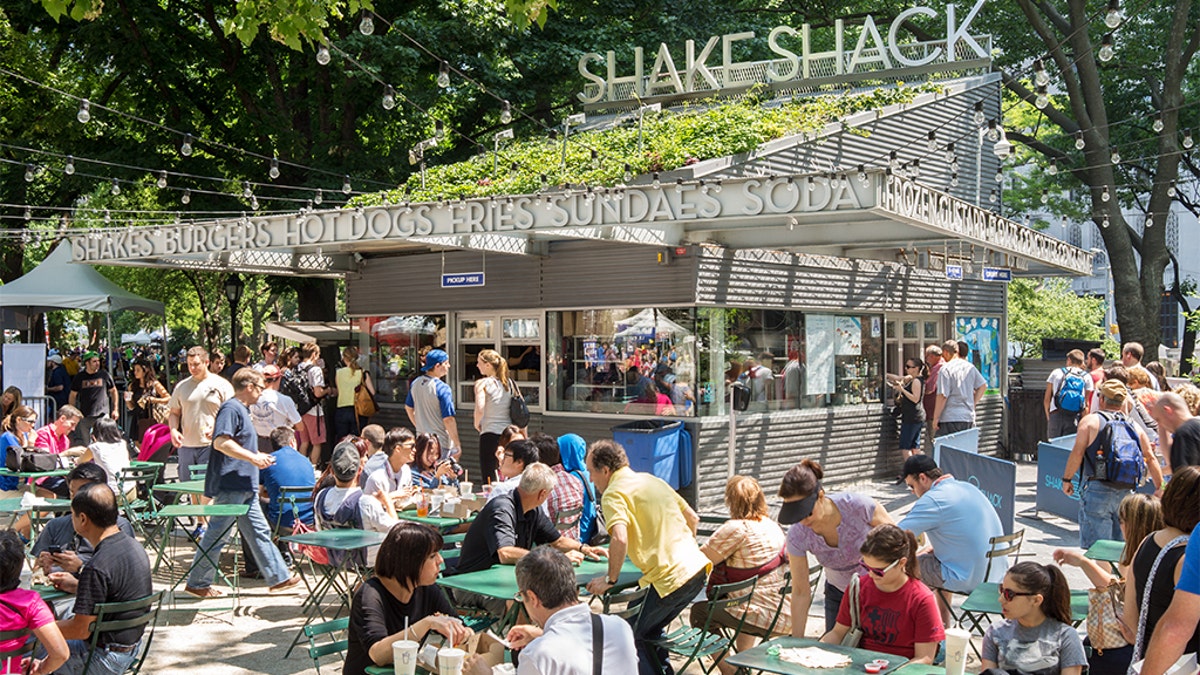
People are shown dining at the original Shake Shack in Madison Square Park in Manhattan. (Fox News )
Broadway’s diagonal swath through the grid is what creates Manhattan’s most well-known intersections.
Bow-tie shaped Times Square is where Broadway slashes through Seventh Avenue; Herald Square, home of Macy’s and steps from the Empire State Building, is where Broadway intersects Sixth Avenue; and Madison Square, original site of the famous sports arena and better known today as the home of the very first Shake Shack, is where Broadway cuts across Fifth Avenue.
4. Broadway still bears the scars of pandemic shutdowns
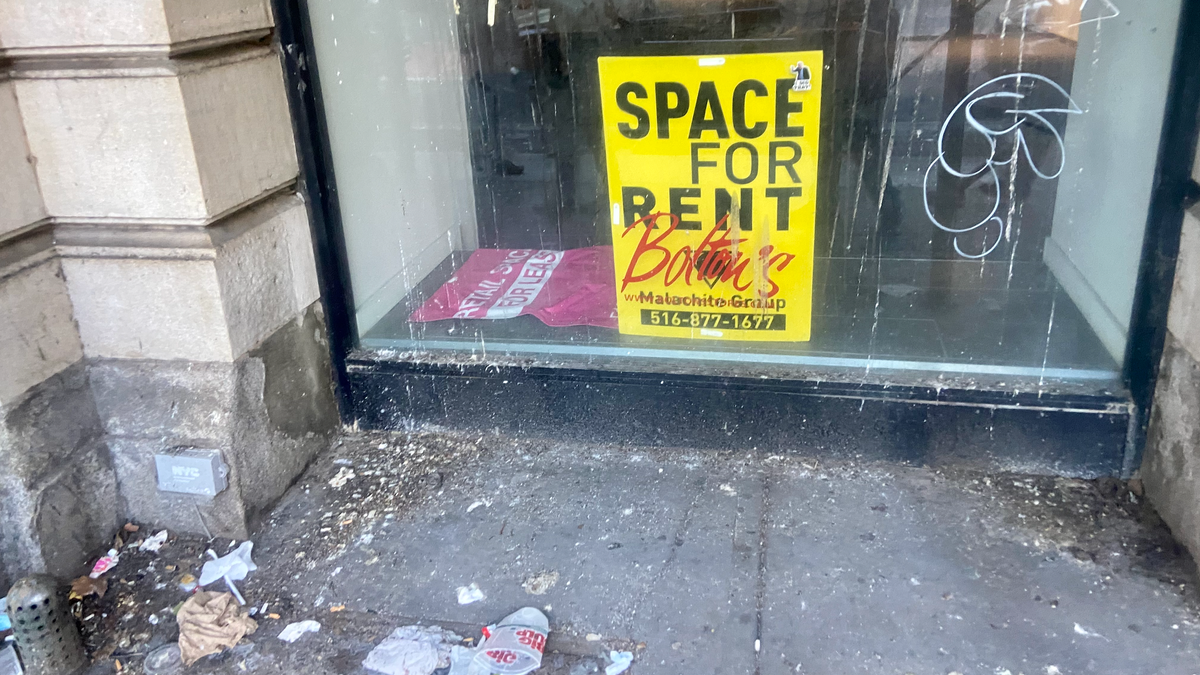
Many parts of Broadway are still bearing signs of destruction caused by BLM riots and COVID mandates that devastated the NYC business community. (Kerry J. Byrne/Fox News Digital)
Foot traffic has flooded back onto much of Broadway. But the business community still has a long road to recovery.
A recent walk down the entire 13.4-mile length of Broadway revealed scores of empty, blighted buildings, even in the city's trendiest neighborhoods.
NYPD REMOVES 2,000 BEES FROM NEW YORK CITY RESTAURANT
"This is just squalor. It’s tragic. It’s really tragic," lamented Jackie Toboroff, a former New York City council candidate as she stood near her home on a blighted Broadway block of Tribeca, arguably the city's swankiest celebrity hotspot, across from City Hall in downtown Manhattan.
"This is liberal utopia," she said.
5. Tourists flock to Wall Street's ‘good luck’ bull on Broadway
Italian artist Arturo Di Modica generated international headlines when he illegally dumped a bronze bull sculpture on Wall Street in 1989.
It was quickly moved. The Charging Bull sits on the edge of Bowling Green, New York City's oldest public park, which includes attractions such as the National Museum of the American Indian, located in the magnificent Beaux-Art National Historic Landmark Alexander Hamilton Custom House.
It's the southernmost building on Broadway.
The Charging Bull found a bronze foil in 2017, when a statue dubbed the Fearless Girl was placed opposite of the stampeding beast and quickly grew into a symbol of female empowerment. The Fearless Girl was moved in 2018 — and placed across from the New York Stock Exchange.
6. There is an actual French medieval monastery on Broadway
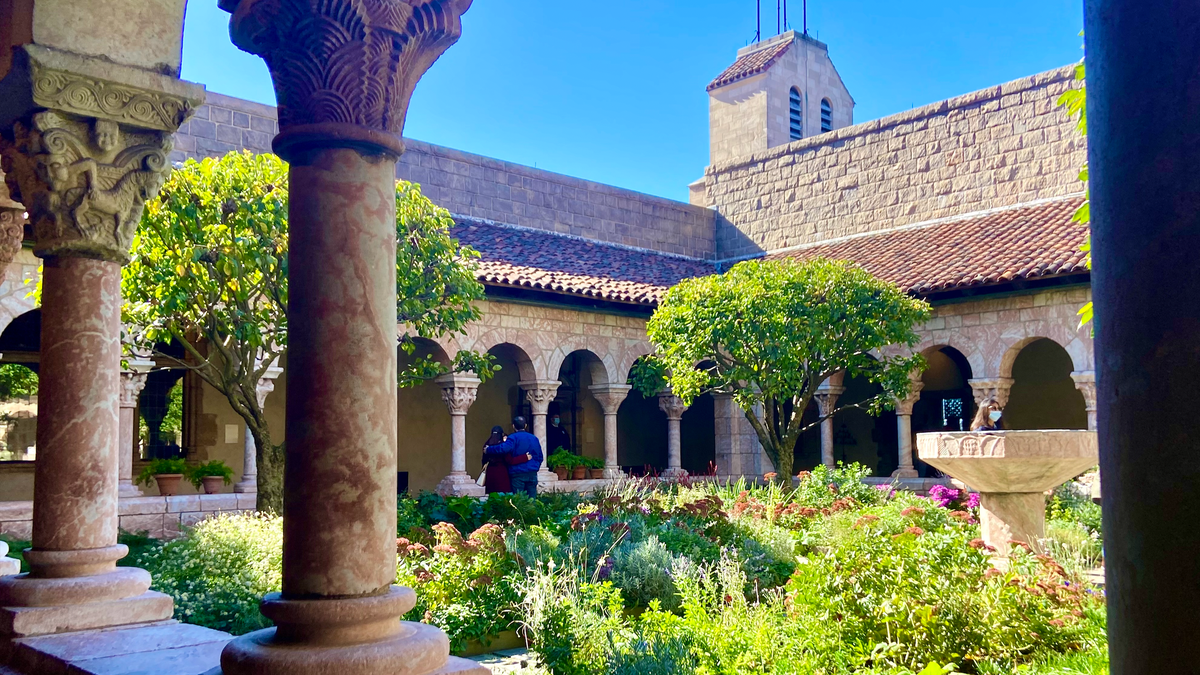
The Met Cloisters, a rebuilt European monastery, houses some of the world's greatest medieval art at Fort Tryon Park off Broadway in northern Manhattan. (Kerry J. Byrne/Fox News Digital)
Fort Tryon Park, accessible via Broadway near the northern tip of Manhattan, contains a remarkable attraction called The Cloisters, operated by The Metropolitan Museum Art.
The main monastic buildings were purchased in France by American artist George Grey Barnard, deconstructed stone by stone, shipped to the U.S. and rebuilt next to Broadway in the 1930s.
MEET THE AMERICAN WHO INVENTED LIGHT BEER
The Met Cloisters contain one of the world's great collections of medieval art, plus surprisingly idyllic views of a quiet wooded stretch of the Hudson River in the middle of New York City.
7. Broadway follows an old Native American path
The famous street follows the path of the Wickquasgeck trail, a Native American north-south path through what was at the time Manhattan’s dense wilderness when Europeans arrived in the 1600s.
It followed a natural flat spine across the island that, even today, has few major hills. It was named Broadway Street by the British after they took over the colony from the Dutch.
Broadway's meandering path through the Manhattan street grid is a legacy of its days as a less structured native use when the shape of the land directed the shape of the road.
8. Spanish is a key language on much of Broadway
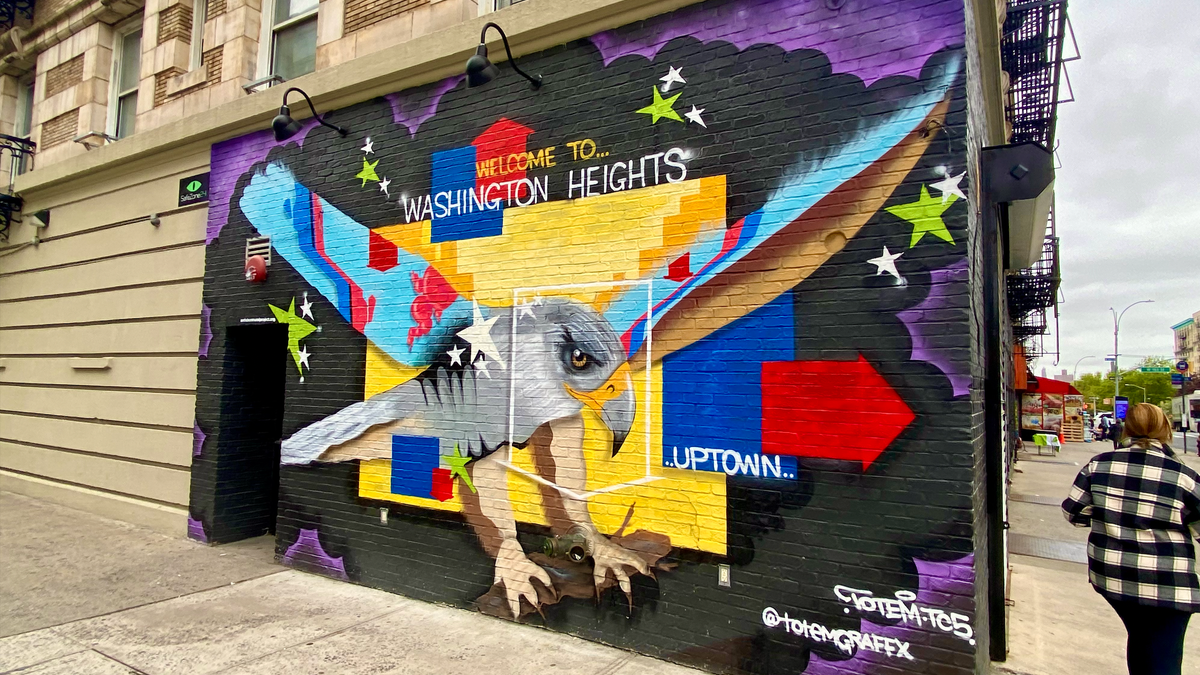
The northern half of Broadway slices through uptown Manhattan's now mostly Spanish-speaking neighborhoods, such as Washington Heights. This mural is located at the corner of Broadway and West 164th Street, 120 blocks north of Times Square. (Kerry J. Byrne/Fox News Digital)
Nearly 2 million New Yorkers speak Spanish at home, according to the U.S. Census — a fact evident on Broadway. (The figure is 1.93 million Spanish speakers at home, according to New York City Department of Planning, citing the U.S. Census.)
8 ROCK STARS WHO ARE ROCKIN' THEIR WAY INTO THEIR 80S
Spanish is the primary language spoken along almost the entire northern half of Broadway, starting with the Inwood neighborhood at the northern tip of Manhattan, and passing through largely Hispanic areas like Washington Heights. Storefront signs, restaurant menus and the spoken word on the street are mostly Spanish in uptown Manhattan.
Linguists have noted that New York City has developed its own Spanish dialect, representing influences of residents who arrived in Gotham from Spanish-speaking nations all over the world, often each with their own idioms and expressions but finding common phrases in Gotham.
9. Many of the world's tallest buildings were constructed on Broadway
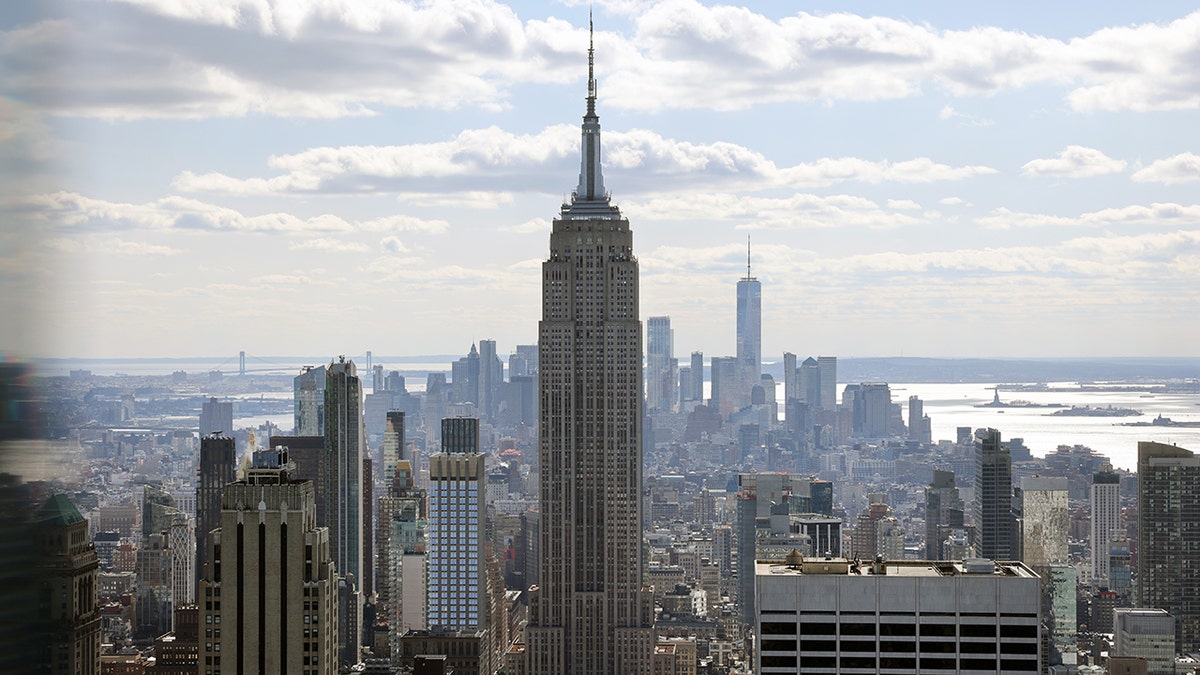
The Empire State Building towers above other office buildings in New York City in this image taken in 2021. (Spencer Platt/Getty Images)
Landmarks such as the Trinity Church (79 Broadway), former Singer Building (149 Broadway) and Woolworth Building (233 Broadway) were either the tallest buildings in New York City, or even the world, at various points.
The Flatiron Building, considered a marvel of architectural engineering and of the city's most beloved structures, is also on Broadway.
The Empire State Building, just steps from Broadway, was the tallest building in the world from 1931 to 1970.
The Empire State Building, just steps from Broadway, was the tallest building in the world from 1931 to 1970, and still arguably the planet's most famous skyscraper.
One World Trade Center, currently the tallest building in America at 1,776 feet, is just a block from Broadway deep in downtown Manhattan. It's also known as One WTC or Freedom Tower.
10. You can eat like Jerry, George, Elaine and Kramer on Broadway
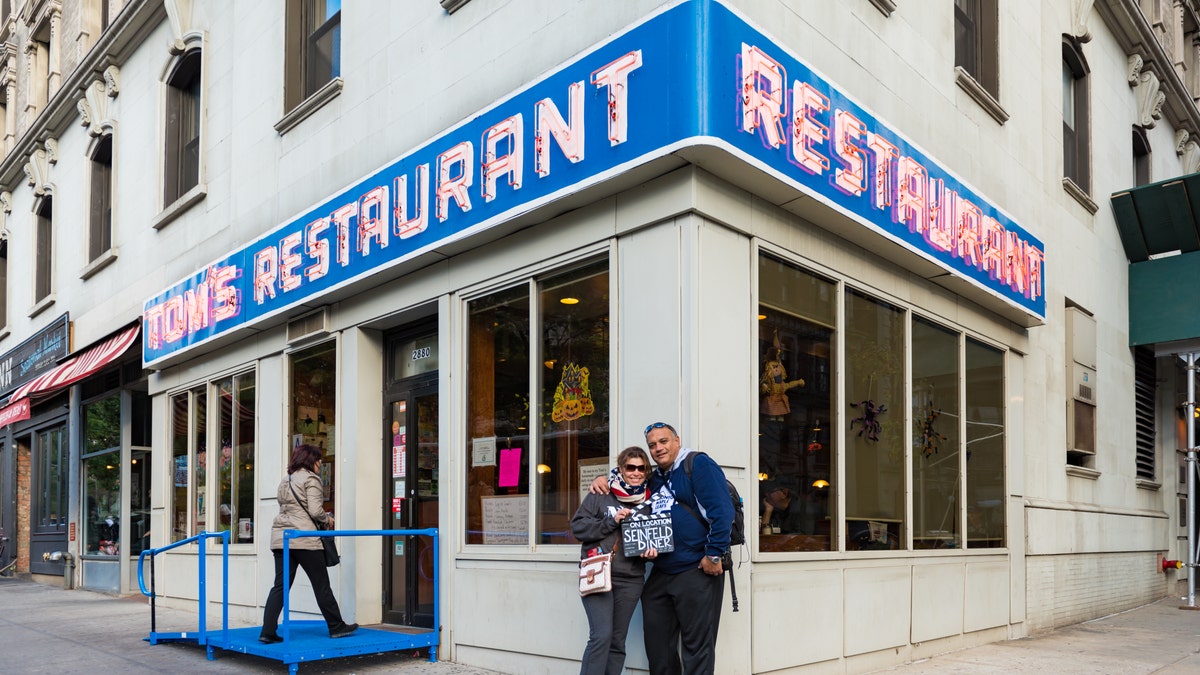
"Seinfeld" fans are shown posing in front of Tom's Restaurant. (Roberto Machado Noa/LightRocket via Getty Images)
Tom's Restaurant, at the corner of West 112th Street near Columbia University, is one of uptown Broadway's beloved landmarks.
The facade of the classic Manhattan diner was made famous by its frequent appearances on the landmark 1990s sitcom "Seinfeld."
JERRY SEINFELD RECALLS MOMENT CAST KNEW ‘SEINFELD’ WAS OVER; ‘SHOULDN’T PUSH OUR LUCK'
The interior of the diner was never used on the show.
The show's famous diner dialogue was filmed on a Hollywood set, and the eatery on TV was called Monk's Cafe.
CLICK HERE TO GET THE FOX NEWS APP
But the show was set in New York City and was popular enough to make Tom's TV-star facade a popular selfie and Instagram hotspot even today, 25 years after the "Seinfeld" crew ate its last tuna on toast.
